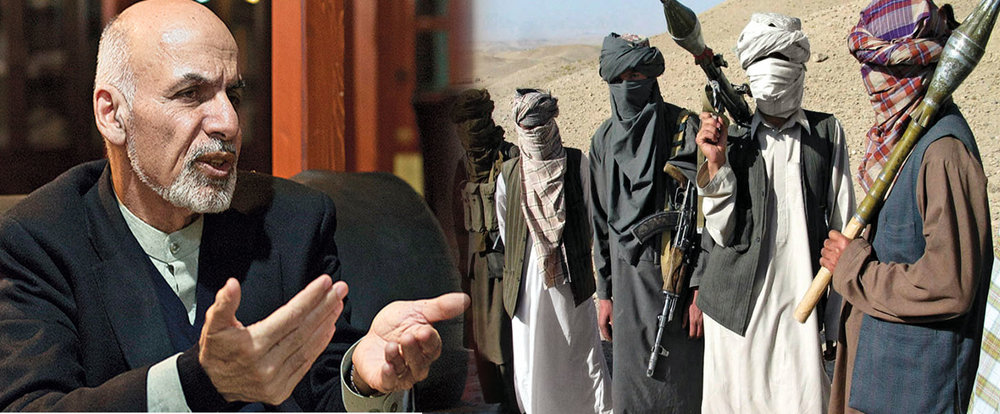President Ghani again extends olive branch to Taliban ahead of Eid al Adha

TEHRAN - Stung by the scathing criticism for failing to contain escalating violence, Afghan President Ashraf Ghani has again extended an olive branch to the Taliban, declaring a conditional ceasefire ahead of Eid al Adha.
In a televised address on Sunday, while marking the 99th Independence Day of Afghanistan, President Ghani said the truce, effective from Monday, would be “until the prophet's birthday provided that the Taliban reciprocate”, making it conditional unlike the previous ceasefire.
Speaking at the iconic Darul Aman Palace in Kabul, President Ghani said the decision to announce ceasefire was reached after extensive consultation with different segments of the Afghan society and Islamic scholars worldwide.
The ceasefire announcement was limited to the Taliban and excluded other armed groups such as the ISIS. The Taliban did not say whether it will reciprocate or not, but in a statement issued late on Sunday the insurgent group said that they planned to free “hundreds of prisoners” on the occasion of Eid.
On Eid al Fitr this year, the Taliban and Afghan government had observed a historic, unprecedented three-day ceasefire, which saw the Taliban fighters and members of Afghan defence forces embracing each other in the streets of Kabul and provincial capitals.
Although President Ghani had extended the ‘unconditional ceasefire’ after the Eid, the Taliban turned down the offer and went back to the frontlines of war. So, after a brief lull, the storm raged again.
The security situation continues to deteriorate in Afghanistan with rising number of terror attacks in different parts of country and mounting civilian casualties. At least 1,600 civilians were killed in the first six months of the year, the highest number in the past decade, the United Nations said in a statement on Sunday.
The report attributed 42 percent of civilian casualties to the Afghan Taliban and 18 percent to the ISIS, noting a fourfold increase in deaths and injuries caused by both the armed groups.
Last week, the Taliban overran a strategic city of Ghazni, which connects Kabul with Kandahar, and it took more than five days for the Afghan security forces to regain control over it.
It was followed by a deadly suicide bombing at a school in Shia-dominated neighourhood of Kabul, which killed more than 50 young children. The attack drew widespread condemnation, with many social media activists criticizing the government in Kabul for failing to protect the citizens.
President Ghani’s ceasefire offer has been welcomed in neighbouring Pakistan. “Pakistan fully supports all such efforts that contribute to achieving durable stability and lasting peace in Afghanistan,” a spokesperson for Pakistan’s ministry of foreign affairs said in a statement.
Recently there were reports about the direct talks between the U.S. government officials and the Taliban in Doha, which raised many few eyebrows in the intelligentsia circles of Afghanistan. Experts believe such talks will push the people of Afghanistan to sidelines and damage the credibility of President Ghani’s government, which has been batting for Afghan-led and Afghan-owned peace process.
“Any talks between the Taliban and the U.S. are doomed to fail, because the people of Afghanistan are the primary stakeholders,” said Mohammad Shabani, a Kabul-based analyst. “President Ghani has made a good offer to the Taliban and the group must seize this opportunity, which will be good for the peace and stability in Afghanistan and the region.”
Leave a Comment